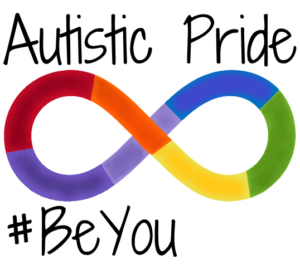An autistic adult who presents childlike with an intellectual disability may actually have a high IQ and a professional job.
At an autism social event at a coffee house I saw “Lindzie” walk into the coffee house and immediately knew that she was with the autism society for our state.
Something about her “looked handicapped,” for lack of a better descriptor.
Visibly in her 20s, maybe early 30s, Lindzie was sloppily dressed and was with her mother.
Her speech wasn’t typical. It was slow and a little difficult to understand, as though she were under the influence of a drug.
She was telling someone that she competes in gymnastics for Special Olympics.
I asked her about that, and in her slow voice – she proudly said she had medals.
I assumed she had both autism and an intellectual disability (i.e., low IQ).
After all, my understanding of Special Olympics is that it’s for people who have what was previously commonly referred to as a mental handicap.
The terminology has changed over the years. It used to be mental retardation. It eventually became mental challenge, then evolved into intellectual disability.
This is a separate condition from Autism Spectrum Disorder. However, a person can have both conditions, but one does not cause the other!
Throughout the social Lindzie hardly talked, though; she wasn’t as dynamic in conversation as some others were.
At the next event she spent most of the time using her phone, not interacting much.
Autism and Childlike Behavior; Can Still Be Very Smart
At the third event, I got the big shocker: Lindzie is a computer programmer and website designer for a major aerospace engineering company.
Her degree is in computer programming.
I was diagnosed with ASD in 2022, but this doesn’t mean I can’t be shocked when I learn of cases such as Lindzie.
Only recently in my life have I been around groups of autistic people, being that my diagnosis came in middle age!
I haven’t had the opportunity to be around other Autists enough to be able to fully appreciate the range of how this Spectrum disorder presents.
On one hand, Lindzie’s proud to have won medals in Special Olympics. Her competition category is Level 2 gymnastics. This is a very rudimentary level.
Yet at the same time, Lindzie could build me a website, is a wiz with coding, and, obviously, interfaces with high-tech personnel at her workplace.
Autism is such an amazing Spectrum. We must not jump to conclusions based on initial presentation.
I’m sure that Lindzie has been talked down to, as though she’s a young child, by many adults – maybe even including autistic ones.
There was another woman there, let’s call her SueAnne. I had first seen her at a Valentine’s dance for people with “developmental disabilities.”
I attended, just in case (a one-in-quintillion chance, actually) I’d meet this young, handsome, tall, fitness-enthusiast man who was also on the Autism Spectrum who shared my interests and values.
Not surprisingly, no such man was present at the event, but I had noticed a woman who had what appeared to be her ID card and a “fidget toy” hanging from a lanyard on her neck.
Being that the event was for the broader category of developmental disabilities, I didn’t automatically assume she was autistic, and instead, perceived her more as having a mental handicap.
Well, at the coffee house, SueAnne took a seat across from me at the long table and began talking – not at all presenting as she had done at the Valentine’s dance (kind of childlike).
She said she was working on obtaining a degree in social work. Her goal was to work at a hospital in that capacity.
Bottom line: Don’t assume someone has a low IQ just because they’re childlike, don’t speak clearly, don’t give good eye contact, aren’t dynamic with conversation, are obese and dressed sloppily, etc.
Autism Spectrum Disorder comes in all flavors, designs, shades and patterns.

“Autism sometimes, but not always, co-occurs with intellectual disabilities, and frequently the stereotypes and stories that are shared by larger agencies and organizations feature individuals who are both autistic and intellectually disabled — perpetuating these views and stereotypes,” explains Dr. Jessica Myszak, licensed psychologist, and director of The Help and Healing Center, whose practice is mostly autism assessment for adults.
The deficits that the site visitor reads about are seemingly ALL from the autism when the story barely, if at all, points out that the profiled individual also has a low IQ.
“Estimates suggest that 31% of autistic people have intellectual disabilities, while 44% of autistic people have average to above average IQs,” says Dr. Myszak.
“Many autistic people hold high level jobs, work in extremely technical fields and create things that take an incredible level of detail and expertise.”











































